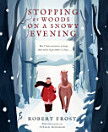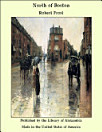A Boy's Will
May 2019 · Otbebookpublishing
Ebook
30
Pages
family_home
Eligible
info
reportRatings and reviews aren’t verified Learn More
About this ebook
The publication of A Boy's Will (1913) and North of Boston (1914) marked the debut of Robert Frost as a major talent and established him as the true poetic voice of New England. Four of his volumes would win the Pulitzer Prize before his death in 1963, and his body of work has since become an integral part of the American national heritage. (Goodreads)
About the author
Robert Frost, born on March 26, 1874, in San Francisco, is one of America's most celebrated poets, known for his vivid depictions of rural New England life and his exploration of complex social and philosophical themes. After the death of his father, Frost's family moved to Massachusetts, where he developed a profound connection to the New England landscape that would deeply influence his poetry.Frost's literary career took off in the early 20th century, and he quickly became known for his mastery of traditional verse forms and his ability to infuse them with modern sensibilities. His work often delves into the human condition, exploring themes of isolation, nature, and the passage of time. Frost's deceptively simple language and accessible style belie the depth and complexity of his thought, making his poetry both widely popular and critically acclaimed.Despite his traditionalist reputation, Frost was a revolutionary in his own right, challenging the conventions of his time with his nuanced portrayal of rural life and his subtle critique of contemporary society. He was awarded four Pulitzer Prizes for Poetry, a testament to his enduring impact on American literature.Frost's influence extends beyond his poetry; he was a mentor to many younger poets and a prominent figure in the literary community. His public readings were immensely popular, and he became a cultural icon, embodying the rugged individualism and contemplative spirit of the American ethos.Controversially, Frost's personal life was marked by tragedy and hardship, including the loss of several children and his wife, which some critics argue infused his work with a profound sense of melancholy and introspection. His complex personality—combining warmth and wit with a darker, more introspective side—continues to fascinate readers and scholars alike.Robert Frost remains a towering figure in American literature, his work resonating with modern readers for its timeless exploration of human experience and its deep connection to the natural world.
Rate this ebook
Tell us what you think.
Reading information
Smartphones and tablets
Install the Google Play Books app for Android and iPad/iPhone. It syncs automatically with your account and allows you to read online or offline wherever you are.
Laptops and computers
You can listen to audiobooks purchased on Google Play using your computer's web browser.
eReaders and other devices
To read on e-ink devices like Kobo eReaders, you'll need to download a file and transfer it to your device. Follow the detailed Help Center instructions to transfer the files to supported eReaders.






